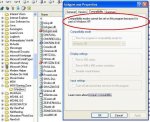Toddskins
Member
There is a game on windows computers called Internet Backgammon. If you've ever played it, you will know that the program cheats for you or your opponent. It doesn't matter which. When the person down needs a very specific roll, it will happen. You can predict the roll of the dice beforehand with uncanny accuracy. And if one person seems to gain a lead, the computer will automatically go into "compensate mode" wherein the person ahead will get a stream of low roll dice, and the person behind will get double sixes, fives, or fours, to bring the two players back to even.
So I have tried many times to erase this game from my computer, and have used two different programs that are supposedly the ultimate File-Killer programs. But they have not worked.
The blasted Backgammon files keep resurrecting. All 3 of them. One .exe and two .dll's.
Is it possible the the OS is designed to replace these files if they are missing, as if they're stored in some strange cache that's inaccessible to users?
So I have tried many times to erase this game from my computer, and have used two different programs that are supposedly the ultimate File-Killer programs. But they have not worked.
The blasted Backgammon files keep resurrecting. All 3 of them. One .exe and two .dll's.
Is it possible the the OS is designed to replace these files if they are missing, as if they're stored in some strange cache that's inaccessible to users?

